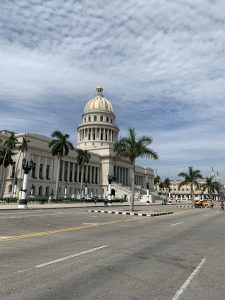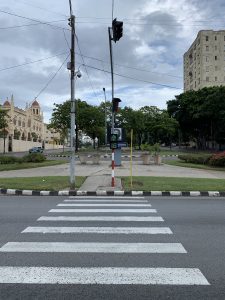Key Findings:
- Despite the regime’s ban and never-ending efforts to end prostitution, it is a common practice for Cubans. They continue to resist prohibition to survive amid scarce opportunities, food, and medicine.
- Prostitutes (commonly known as jineteros) and pimps offer their services chiefly to tourists, who are able to spend more on sexual services. Therefore, sex workers usually wander tourist plazas, bars, and streets.
- There is no established price for sexual services, as jineteros and customers reach an agreement before proceeding to have intercourse. Prostitutes, if they work with pimps, must pay them fees for help getting customers.
- Prostitutes and pimps face multiple challenges and dangers such as getting arrested or scammed or contracting sexually transmitted diseases. The scarcity of protection implements such as condoms is a factor that exacerbates the dangers.
Overview
When late Cuban dictator Fidel Castro took power in 1959, he sought to eradicate homosexuality and prostitution. For Castro, people performing those practices “cannot personify the ideals of a communist militant.” In October 1962, the regime conducted numerous warrantless raids to capture them. Cubans call this episode “The Night of the Three Ps,” because officials harassed pimps, prostitutes, and homosexuals (pájaros).
Over 1,000 arrested pimps, prostitutes, and homosexuals, officially described as being “anti-values,” were taken to concentration camps. There the dictatorship sought to reeducate inmates politically, treat homosexuality as a disease, and force prisoners to work.
For six decades, Fidelista officials have asserted that the regime managed to get rid of prostitution on the island’s streets. However, multiple media reports addressing the always-existing presence of prostitution contradict the regime’s narrative.
According to Radio Television Martí, prostitution became more common in the 1990s. Back then, Cuba was going through an economic downturn due to cuts in aid from Russia after the fall of the Soviet Union. In addition, the country decided to open its doors to international tourism. This enabled sex tourism.
The Cuban Penal Code prohibits prostitution of both minors and adults along with soliciting, exerting control, and earning off prostitutes. However, these are frequent practices on many Havana streets, especially in most touristic neighborhoods such as Old Havana, Havana Center, and Miramar.
This investigation explains why Cubans resort to prostitution and the situation for prostitutes trying to make a living. The Impunity Observer spoke with four Cubans on the island, three of them working in prostitution. One works in tourism where she can witness interaction with locals. Due to fears of identification and reprisal, they all requested anonymity.
Why Cubans Resort to Prostitution
As the Impunity Observer reported in October 2022, “Cubans are struggling with new levels of poverty, famine, blackouts, and deficient medical care.” Those who do not receive remittances from family or friends are the ones who are suffering the most. An October 2022 report from the Cuban Observatory for Social Rights (COSR) asserts that 72 percent of citizens live below the poverty line of $2.15 per day.
Due to scant economic and job opportunities on the island, men and women see prostitution as a viable way to obtain money for food and other family needs.
A pimp in Paseo Avenue, Havana, told the Impunity Observer: “I started providing these services after I lost my job as a waiter in a local restaurant (commonly known in Cuba as paladar) due to the COVID-19 pandemic.” He needed to provide for his five-year-old son and his mother, who was not able to work because of her age and health complications. He prefers this job over others because he gets to earn in foreign currencies.
Male prostitution is also common on the island. In 2021, local news outlet Cubanet interviewed a jinetero, who contended: “I have to prostitute myself because I need to buy stuff. One Cuban salary is not enough to live here for an entire month.” He explained that Cuba’s cost of living is much higher than the monthly minimum wage, which is worth approximately $12.
The same is true for other prostitutes, regardless of gender. “I have had other jobs, but they did not work out, which is the main reason why I became a prostitute,” contended a jinetera on the streets of Havana. She highlights that her current occupation has allowed her to live by herself and be an independent woman. She admitted she would like a different job, but no alternative pays the same.
How Jineteros Operate
Prostitutes wander across Cuba’s most touristic zones, because tourists are usually the ones who are willing to pay and can afford their services. In the capital, the pier, Center, and Old Havana are the most common neighborhoods where prostitutes loiter. In Center and Old Havana, prostitutes and pimps go to parks and plazas to find new customers. They also roam seeking tourists in bars.
For instance, when visiting Havana, within two hours four pimps offered prostitution services at Martí Drive on a Wednesday night to an Impunity Observer researcher. Located between Old and Center Havana and close to over 50 hotels, Martí Drive is popular among tourists and famous for its nightlife, with multiple bars and iconic monuments and buildings such as the Capitol.

Prostitution, however, does not limit itself to these tourist zones in Havana’s downtown. A pimp in Vedado, a mostly residential neighborhood, offered the Impunity Observer researcher prostitutes, food in specific restaurants, and even tours around the city.
Prostitutes usually work on the streets by themselves, approaching and contacting tourists that seem interested in their services. However, they usually also give their phone numbers to pimps. If a pimp gets a customer, he can swiftly call the prostitute at any given time. For his services, the pimp charges a fee to both the prostitute and the clients.
The pimp in Vedado told the Impunity Observer researcher that clients could request a woman with his preferred characteristics such as hair color, skin complexion, and figure. The pimp contacts a prostitute who resembles the customer’s description the most or offers alternatives.

Fees charged by pimps and prostitutes vary, depending on clients’ requests and the agreement they reach. Some prostitutes charge between $80 and $100 for an intercourse session, but there are no time limits. Customers, however, tend to bid lower prices, starting at $20. To avoid scams, prostitutes charge the customer before the act. In an interview with a Cuban YouTuber, a prostitute claimed she earns around $300 per day of work.
An anonymous Havana-based prostitute contends jineteras who work on the streets charge lower fees than those who go to bars. Consequently, she prefers to go to bars to ask for a higher price.
Depending on the customer’s accommodation, they go back to the customer’s dorm or seek other dorms for rent for a night or a couple of hours. Prostitutes claim that hotels are more difficult to enter because they usually have policies that forbid outsiders from entering the guests’ rooms. In this case, they find a different place such as dorms for rent near their location.
Prostitution in Havana: Easy Money?
“There are plenty of jineteros in Havana because it is the easiest alternative to make money and buy stuff such as groceries,” a Cuban hotel worker told the Impunity Observer. Pimps and prostitutes, however, face multiple challenges and dangers.
They can be subject to arrest either for prostitution or harassing tourists. According to all the interviewees, police officers that encounter sex workers approaching tourists give them “warnings or directly imprison them.” The Penal Code establishes 4–20 year prison penalties for those involved in sex work.
Prostitution also portends health risks for workers and customers. On a regular basis, due to scarcity problems, Cuba lacks implements to practice protected sex. This affects not only prostitutes and their customers but most Cubans. Condoms, for example, have been scant in Santiago since 2019. Pharmacies, as documented by the Impunity Observer, have few products to offer their customers. The 2022 COSR report asserted that eight out of 10 Cubans were unable to purchase their medicines from pharmacies from August through September.
Another risk that prostitutes face is scams and extortion by their clients. A Havana-based prostitute contends she fears that some of her clients, aware of the illegality of their actions, will call the police at any given time. She also says that if she does not charge her customers in advance, she faces the risk of getting scammed. In this way, she makes sure she gets paid in advance every time.
In addition to these dangers, the cost of quick money associated with prostitution is abandoning dreams and fueling conflicts at home.
A sex worker that has a partner shared the difficulties of carrying out her job and being in a relationship at the same time. Although her partner accepts it due to her income, she said her occupation has led to multiple arguments between her and her partner. She claims she would love to be a hairdresser, but she and her family—her boyfriend and one baby boy—would starve to death if she followed her dream.
One of the jineteras that the Impunity Observer talked to lived in a slum (a solar, as they are commonly known) in the Jesús María neighborhood. She shared that she had to go back to her home every day in order to take care of her two brothers, who were kids between the ages of three and five years old. She wishes she could study at the university and follow a career path in her life. In addition, she would love to escape Cuba at some point in her life.
Despite Castro’s attempts to eradicate it, the world’s oldest profession has never been absent from Cuba. With time, it has become an important alternative for those who want to earn a better salary than those offered by the regime and precious few private businesses. However, prostitution, while providing relative financial stability, entails multiple dangers and challenges for jineteros, including forgoing long-term aspirations.
 Join us in our mission to foster positive relations between the United States and Latin America through independent journalism.
Join us in our mission to foster positive relations between the United States and Latin America through independent journalism.
As we improve our quality and deepen our coverage, we wish to make the Impunity Observer financially sustainable and reader-oriented. In return, we ask that you show your support in the form of subscriptions.
Non-subscribers can read up to six articles per month. Subscribe here.



